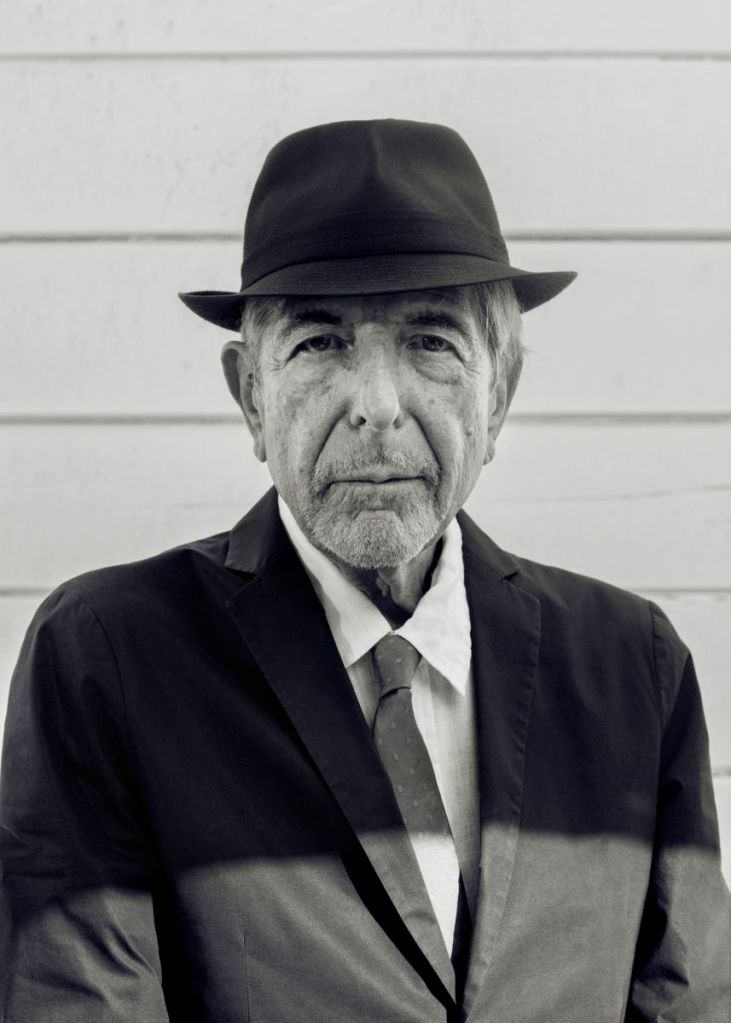In the golden age of the Persian Empire there was a community of thinkers, Sufis they were called, whose poetry and song celebrating wine, love and spiritualism had them demonised by the pious as heretics, debauchees and drunks. Their Holy Trinity was their lord, love, and leisure, and for them the three could not be separated: if God was love, then love was god, in all its amorous array. Rumi’s beloved was probably both corporal and divine when he wrote:
Oh Beloved,
take away what I want.
Take away what I do.
Take away what I need.
Take away everything
that takes me from you.
Rumi, Hafiz, Attar, Omar Khayyam were the greats, and Leonard Cohen is the latest in the line. His verse just as skilful, his thought as free, Cohen’s brand of Sufism he called ‘The Order of the Unified Heart’ – its symbol two crossed love-hearts playing on the Star of David, the symbol of his exiled ancestors, of his formal faith. Listening to Cohen you often do not know whether he is talking about the divine or of love: the two are inseparable. Halleluiah, his universal prayer, is emblematic, and countless other songs do the same. Sisters of Mercy, Christ-like, sanctifies prostitutes, and Lover, Lover, Lover could be the plea of corrupted man to his lord or that of a corrupted lover to his beloved.

Reducing religion to its essence – to spirituality, to wisdom, philosophy, lore – Cohen took the ancient stories and put them to song. The Story of Isaac, for instance, haunts you in its depiction of Abraham going to sacrifice his trusting son on the alter. Cohen gives young Isaac a voice in the present, writing:
You who build the alters now/to sacrifice these children/you must not do it anymore/..you who stand above them now/your hatchets blunt and bloodied/you were not there before/when I lay upon the mountain/and my father’s hand was trembling/with the beauty of the word”
Cohen showed me that religion is best understood as lore, not law, despite what its self-appointed leaders would have us believe. Omar Khyaam said it an age ago when he wrote:
And do you think that unto such as you
a maggot-minded, starved, fanatic crew
God gave the Secret, and denied it me?
Well, well, what matters it! Believe that too.
A libertarian in love, Cohen was too a libertarian in politics. He knew, as Everybody Knows, that “the fight was fixed; the poor stay poor and the rich stay rich”. He knew, as everybody knows, that “the deal is rotten; Old Black Joe’s still pickin’ cotton, for your ribbons and bows”. Yes, he knew, but he knew too that history is long, very long. His album The Future foresaw the now postponed arrival of a truer Democracy to the USA “the cradle of the best and the worst”, and his Anthem is a powerful call to “ring the bells that still can ring, forget your perfect offering, there is a crack in everything; that’s how the light gets in..” – echoing Rumi a thousand years before when he wrote “The wound is the place where the Light enters you.”
Cohen’s songs have made him a hero for those movements erupting around the globe that seek a democratic restoration. Syriza in Greece and Podemos in Spain frequently played his First We Take Manhattan as a call to arms in their campaign meetings. But perhaps his most aesthetically attractive piece wasn’t even his own, but that of the Canadian poet-politician F.R. Scott, whose Villanelle for Our Time Cohen put to music, an Apostles’ Creed uttered “from bitter searching of the heart/quickened with passion and with pain…
This is the faith from which we start:
Men shall know commonwealth again
From bitter searching of the heart.We loved the easy and the smart,
But now, with keener hand and brain,
We rise to play a greater part.The lesser loyalties depart,
And neither race nor creed remain
From bitter searching of the heart.
Cohen was a lover in the broadest sense of the word: ideologically and amorously. His love songs exemplify the very genre of love songs, and perhaps one of his best was The Stranger Song, a song which beautifully describes the story of ‘just some Joseph’ who was ‘looking for a manger’. This song captures the nuances, the psychology, the die-throwing, the doubting, the fear, the role-trading, of anyone who meets another along the long road. For a longer-acquainted friend, Cohen in his last album wrote a beautiful, simple, love poem: If I Didn’t Have Your Love – echoing Hafiz, who wrote of his own eye’s apple “The Earth would die if the Sun stopped kissing her” – tells his reader “If the sun would lose its light/And we lived an endless night/And there was nothing left that you could feel/That’s how it would be/What my life would seem to me/If I didn’t have your love to make it real.”
Cohen – the lover, the libertarian, the liturgist – was a teacher of mine and a million others, a maestro of his trade. He once said that poetry is just evidence of life – that if your life is burning well, then poetry is just the ash. His life was well-burnt.





This is really beautiful Tim. I have just finished the book ‘The Forty Rules of Love’ and are a little Sufi obsessed at the moment.
LikeLiked by 1 person
Oh thankyou Liz, I hadn’t heard of that book, I’ve already put it on my to-read list
LikeLike
Cohen be best described as an Anarchist. In fact most libertarian don’t understand that they are actually anarchists like Emma Goldman
LikeLike